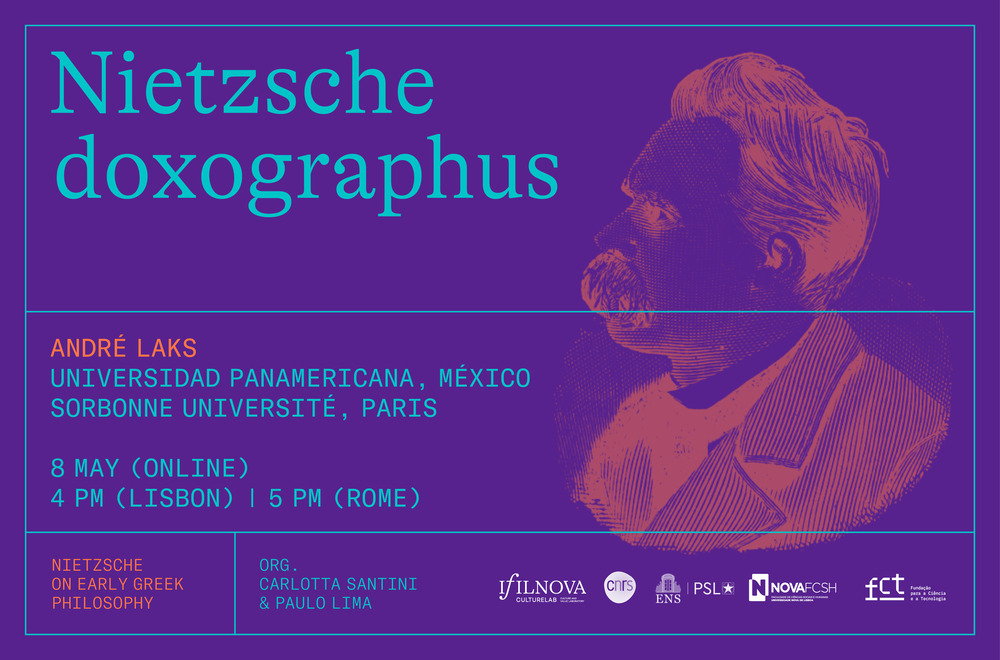André Laks

8 May | 4 PM (Lisbon)
5 PM (Rome) | for other locations click here.
Abstract
I shall consider Philosophy in the Tragic age of the Greeks (PTG) as a whole, rather than Nietzsche’s interpretation of a particular philosopher. The emphasis will be, then, on the programmatic Preface and the first two sections. In what sense is PGT the «justification of philosophy» it claims to be or, as Nietzsche jots down in a fragment dated from the period of its writing, «The Birth of Tragedy considered from another angle. The confirmation from the philosophy of its contemporary»? I shall suggest that Nietzsche writes PGT with Jakob Burckhardt’s ambivalent attitude to philosophy in mind – philosophy as a positive cultural phenomenon characterized by the emergence of ‘free personality’, on the one hand, philosophical teachings as a doubtful enterprise characterized by its aloofness from the real Greek ethical life, on the other hand. I shall then argue that there is a tension in PTG between a «‘great personality’ centered» history of philosophy and a «dialectical» one, and that this is the reason why not only Diogenes Laertius’ Lives but also Aristotle’s narrative in Metaphysics Alpha stand – formally – at the background of PTG (pretty much as Aristotle’s Poetics stands formally at the background of BT). I shall conclude by explaining what ‘Diogenes Laertius’ is the name of and by the same token suggest a philological solution to the mystery of the ‘three anecdotes’ mentioned at the end of the Preface.
André Laks (Universidad Panamericana, Mexico/Sorbonne Université, Paris)
Nietzsche On Early Greek Philosophy | Online Seminar
Org. Paulo Lima (Lisbon Nietzsche Group/Research Group on Ancient Philosophy/IFILNOVA) and Carlotta Santini (CNRS/ENS, Paris)
The seminar seeks to explore the dialogue between Nietzsche and early Greek philosophy during the period when he was Professor of Philology at the University of Basel. This is a subject that has not been studied in a systematic way, although there are some decisive contributions showing its importance for understanding Nietzsche’s philological and philosophical thinking. Our purpose is to provide a platform on which contributions from specialists in Nietzsche and ancient philosophy can be presented, debated, and complemented to fill this gap in Nietzschean studies. Key topics of the sessions will be Nietzsche’s activity as a scholar of ancient doxography on early Greek philosophy, his general conception of what he called the “pre-Platonic philosophers”, as well as his interpretation of some of these philosophers. The body of texts to be studied during the sessions includes not only the published ones, but also Nietzsche’s lectures, notebooks, and correspondence. The seminar is part of the activities of the Lisbon Nietzsche Group and the Research Group on Ancient Philosophy (CultureLab/IFILNOVA). It is the result of a collaboration between IFILNOVA, the Centre Nationale de Recherche Scientifique, and the École Normale Supérieure (Paris). It will take place monthly starting from October 2023 and will have nine sessions. It will be open to all interested parties, who will be able to register for each session by contacting the organizers (plima@fcsh.unl.pt, carlottasantini@hotmail.it). For more details, please see the programme below.
Next sessions
Session 8
5 June, 4 PM (Lisbon) | 5 PM (Rome) | for other locations click here.
Daniel Conway (Texas A&M University), “How Socrates Became What he Was: The Evolution of a Diagnosis”
Session 9
19 June, 4 PM (Lisbon) | 5 PM (Rome) | for other locations click here.
Anne Merker (Université de Strasbourg), “Nietzsche, Heraclitus, and Polemos”
Event supported by the Foundation for Science and Technology (Fundação para a Ciência e para a Tecnologia) of the Portuguese Ministry of Education and Science under the projects UIDB/00183/2020 and UIDP/00183/2020.

